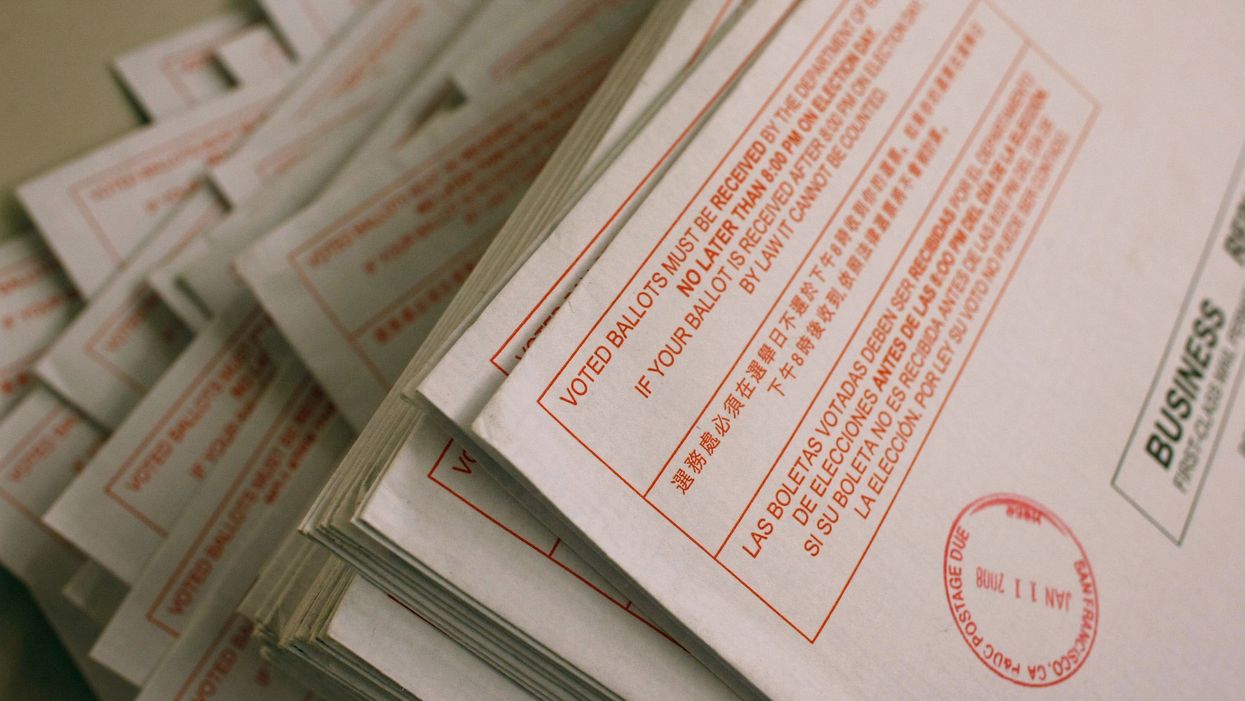Decisive majorities in three new polls favor making vote-by-mail the default setting for this year's election — support matched neither by sufficient federal funding to make that plausible, nor by a widespread embrace from some progressive groups along with Republican lawmakers and election administrators.
The newest survey, out Tuesday from NBC News and the Wall Street Journal, found 58 percent favoring a national mandate that all eligible voters always be permitted to vote by mail. An additional 9 percent favor a switch only this year, because the coronavirus may remain a significant public health threat in November.
A nationwide poll unveiled over the weekend by Newsweek pegged support for allowing everyone to vote absentee this fall at 72 percent. It was 68 percent in a survey of battleground states released by Democracy Corps last week.
The significant shift in public attitudes toward mail voting, which fewer than half of Americans backed two decades ago, comes mainly from Democrats — underscoring the chance that proposed innovations and contingency planning to safeguard this year's presidential contest will drown in partisan disagreement.
The latest economic stimulus package being developed by Congress is almost entirely about helping small businesses and hospitals and addressing the shortage of virus tests. Talks are already getting started on the fifth recovery measure, however.
Those negotiations will determine if Republicans agree to more than the $400 million already delivered to the states to spend as they wish to make voting easier and safer this year. Democracy reform groups have united behind the view that at least $1.6 billion more is needed to prepare for a huge increase in absentee ballots expected this fall, whether or not states make the process easier because of Covid-19.
Democrats, meanwhile, will be forced to decide how long to pursue their goal of requiring the states to have wide-open absentee voting along with expanded registration and in-person early voting.
One focus is on the 16 states that now demand a specified excuse from voters asking to cast their ballots away from a voting station. (The others permit voters to submit absentee ballots without explanation, except for the five that conduct elections almost universally by mail.)
While only a few excuse-required states have started moving to loosen those rules on their own, civil rights groups take heart that the group includes states run by both the GOP and Democrats. The same is also true of the 14 states that have postponed primaries or changed to predominantly vote-by-mail at a time when stay-at-home orders are in place and visiting voting places would risk the health of both poll workers and voters.
This emphasis on remote voting has led to intensifying concern from civil rights groups, which say many minority voters will be effectively disenfranchised unless significant numbers of polling places remain open.
In-person voting in Ohio's primary next week will be available only to the disabled or homeless. Similar restrictions are in the works or under discussion for upcoming primaries in Florida, New Jersey and Nevada. And left out of those discussions are many people who move frequently but don't vote that often — people who would most easily get overlooked when absentee ballots get sent out.
There are also racial disparities in reliance on the absentee option. Only 11 percent of African-Americans cast a 2018 midterm ballot by mail, less than half the rate of white and Latino voters, according to a study out Monday by the liberal Center for American Progress and the NAACP.
Switching how most people vote just months before an election has caused concern among election officials in both parties. The Board of Elections chairman in overwhelmingly Democratic Washington, D.C., Michael Bennett, said last week it would be irresponsible to proactively send ballots to everyone on the city's rolls without two years of planning and testing — in part, he said, because "there's just a ton of bad data in everybody's systems."
Any federal mandates on how states run their elections are a non-starter for President Trump and he has also sounded increasingly hostile to spending any more to ease mail voting, which he says is an invitation to significant cheating and always benefits Democrats disproportionately.
There's no evidence of widespread fraud or that one party can count on doing best in vote-by-mail contests, although an assessment of this month's hotly contested state Supreme Court race in Wisconsin suggests the liberal Democrat's upset win was aided by her party's aggressive efforts to get absentee ballots into supporters' hands in time.
A panel Trump created in 2017, after asserting he only lost the popular vote because millions had voted fraudulently, found no significant evidence of such corruption and was quietly disbanded the next year. Trump himself voted absentee in the Florida primary in March and in the 2018 midterm when he was still registered in New York.
Support for his view from fellow Republicans comes through in the new polling.
Of the 67 percent in the NBC-WSJ poll who back voting by mail at least this fall if not indefinitely, 88 percent were Democrats and 69 percent were independents but just 44 percent were Republicans. (The poll of 900 registered voters was conducted April 13-15 and had a 3.27-point margin of error.)
In the Democracy Corps survey in 16 purple states, taken March 31 to April 5 by the Center for Voter Information, 83 percent of Democrats but just 51 percent of Republicans supported people voting by mail for any reason. The Newsweek survey, of 2,394 registered voters April 14-16 by Harvard and Harris Insights and Analytics, did not include a partisan breakdown on the voting question.




















